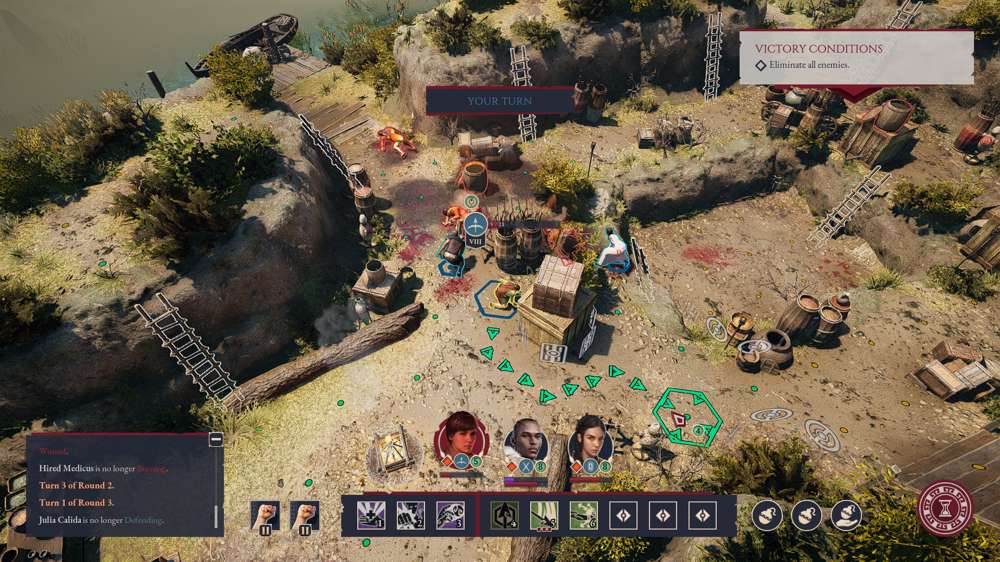Expeditions: Rome Review: "As A Historical Role-Playing Experience, It Stands Unrivalled"
Expeditions: Rome is the third entry in the series, this time whisking players away to ancient Rome during the first century BCE, but how does it fare in the CRPG genre?

Ancient Rome remains a constant fascination for our modern world. It's so distant and alien to us, with its strange mix of civility, barbarity, opulence, and squalor, that creates this image of an almost fantastical society. Expeditions: Rome revels in this, presenting an alternate history of the crucial first century BCE period where Rome changed from a republic to an empire.
The game explores this setting with rich ambition, blending role-playing, turn-based combat, and even strategy elements into one. It's something explored by previous games in the series, Expeditions: Conquistador and Viking, but with a lack of polish, presentation, and refinement. This third entry is aiming to address that with lofty aims and untapped potential in the CRPG genre.
A Dash Of Caesar, And A Sprinkle Of Augustus

Expeditions: Rome begins as a rival patrician and his brother plot to overthrow your family by secretly murdering your father and marrying your sister - forcing you to flee Rome proper. With the help of some allies, you end up in Asia Minor where Rome is at war with the invading Kingdom of Pontus, and soon find yourself at the centre of the Republic's major conflicts, and a key player in discovering a conspiracy that threatens Rome itself.
It's an extremely promising setup, and you quickly gain the chance to rise high in military command. Much of the experience reinforces your position as an important Roman, presenting you with control of entire legions, interactions with histories' most important figures, and decisions that will change the fate of the Roman Republic. Many RPGs take time to lead you into the position of power you begin this game with, but starting at this point is essential to the role-playing of Expeditions: Rome. It's like a cross of the standard chosen-one and revenge tropes many stories begin with, but feels fresh with the implementation of a detailed and honest antiquity setting.
The game wants you to feel like a legendary historical figure through your actions and role-playing choices, building your character into an alternate history Julius Caesar and Augustus, all in one. The game does bear some resemblance to the true history of this period too, with real characters, conflicts, and events, however they've been restructured to fit the mostly-fictional narrative, and allow players to have a hand in how their version of Rome pans out.
The game even draws attention to its place in alternate history, and the character's spiritual connection to Caesar and Augustus. You meet a young Julius Caesar very early in the game, and not long after, he is unceremoniously killed-off. Afterward, your party of characters gather to discuss his death, and even bemoan that he would have made a great commander and significant figure in Rome. It's basically a joke, but the moment represents the passing over of the reins of history to your protagonist - the developer's way of signalling that you're in control of this theatre of the past.
Ultimately, Expeditions: Rome immerses itself in the place and time of the 1st century BCE, and its rich world-building, environments, and aesthetics help to flesh-out the ancient world. The hook of letting you personally author history is also excellent for bringing players in, and puts much more weight behind the decisions.
History Is A Series Of Choices

As a role-playing game, a big aspect of the experience involves making both large and small choices that help to define your character and shape the surrounding narrative. While the major decisions that impact Rome itself are weighted toward the end, the choices you make do help to characterise your protagonist throughout the experience. You aren't shoehorned into the role of a 'good guy,' and often it's to your benefit to abuse your authority or take advantage of people - something which feels honest to the portrayal of the setting, and allows for more effective role-playing. As the central story is mostly morally neutral too, any of your role-playing choices feel valid.
The strength of the role-playing and choices will certainly drive up your investment into the plot, but it can lag for long periods, as sometimes it feels like you're getting no closer to your goal. The second act in particular suffers from this slow pacing, but the third act tightens it up again by involving the antagonist more and redirecting focus back to the matter at hand.
There is also the consistent whiplash of this game's dialogue, which can frequently hop between antiquity-appropriate and anachronistic in a moment. There's some genuinely interesting writing to be found here at times, and often smaller character moments can present intelligent musings on complex topics, but it feels like hollow worldbuilding after hearing a character call you 'lover boy' due to an ongoing romance.
This inconsistency in the quality of the writing is strange considering how much effort has gone into replicating the other aspects of antiquity, such as small details about how characters address you, to the attitudes that certain factions or peoples hold. The game does also allow you to completely eschew these beliefs if you wish, letting you develop a protagonist with almost utopian views for the time, and despite where the writing falls short, the opportunity for characterisation remains consistent.
Turn-Based Gladiators

One of the other major elements to Expeditions: Rome is the turn-based combat and warfare systems - and you'll spend a large portion of the experience taking part in both. The turn-based combat should be familiar for anyone who has played the Divinity: Original Sin series, featuring your party of different classes, who have movement and action points to use. With only four classes to choose from, each one feels distinct and unique in their role in battle, and with three skill trees each to specialise into, you can develop your party to your liking.
Occasionally, the combat does drag on, which is especially prevalent during the later sections of the acts, where you'll besiege a city through multiple stages that can potentially take hours. There are also random encounters which can be found as you explore the world map, and while there is variety to the situations that will arise from these - with buffs, items, and quests springing from them - every surprise fight was groan-inducing as you had to take part in a battle you didn't decide to commit to.
The warfare system also could have done with more time in the oven, as it feels thin. Essentially, you have control over a legion, with the option for more later in the game, and through the world map you may move the legion around to attack outposts and gain territory, collect resources, and complete missions for supplies.
There's no challenge or strategy to the system though, as every fight can be easily beaten by focusing on defence, and the rest of the mechanics just involve sending a legion somewhere and watching as you reap the rewards. This is also what ends up slowing the pacing during some acts, as you have to take over most of the territory before embarking on the final mission, which feels like an artificial means of inflating the gameplay.
A More Refined Expedition

While the previous Expeditions titles were held back significantly by their lack of polish and presentation, Rome seems to have fixed many of these issues. The UI is clean and informative, and there were barely any bugs which inconvenienced the experience. There were two crashes when entering a legion camp, and sometimes the music would cut out or battle sounds would continue afterward - but none of this significantly detracted from the game.
In the end, Expeditions: Rome rises above the previous entries clearly, with more polish and refinement than ever before. The game may not fully achieve its aims due to some underdeveloped systems and inconsistencies in the design, but as a historical role-playing experience, it stands unrivalled. It's a must-play for anyone with an interest in Ancient Rome, and it offers more than enough for fans of CRPGs.
3.5/5
Reviewed on PC. Code provided by the publisher.
Comments

